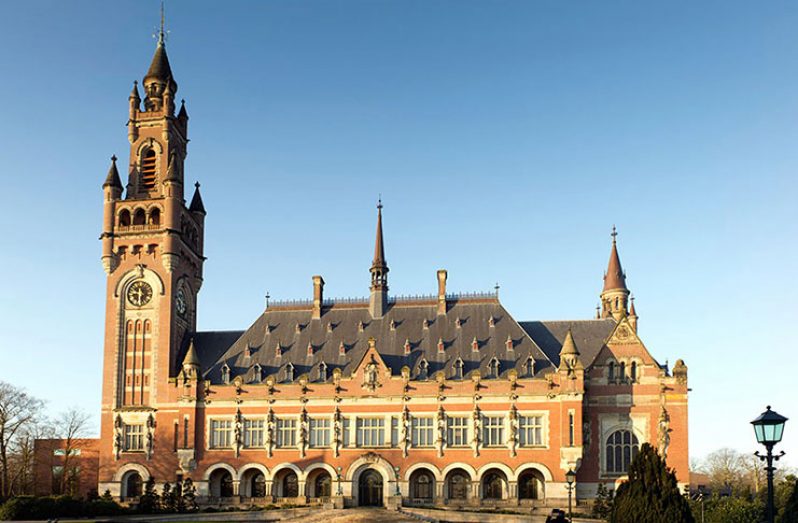– as reach of dreaded coronavirus widens
By Svetlana Marshall
THE global coronavirus pandemic has forced the International Court of Justice (ICJ) to postpone oral proceedings in the 1899 Arbitral Award case, which were set to commence next Monday.
“…The International Court of Justice has informed Guyana that the oral proceedings, scheduled to begin on March 23, 2020, have been postponed due to the current worldwide health crisis,” the Ministry of Foreign Affairs disclosed on Monday. The matter was set for Monday, March 23 to Friday, March 27, 2020 at the Peace Palace in The Hague, however, a new timeframe for oral submissions will have to be set, due to the worldwide health crisis.
Globally, the judiciary has been taking precautionary measures to safeguard not only those working within the judicial system but those seeking access to justice as well as the world grapples with the deadly coronavirus.
Guyana has long been ready to defend its position that the world court has jurisdiction to adjudicate on the validity of the Arbitral Award of 1899 that established the boundary it shares with Venezuela.
In the age-old controversy, Venezuela has argued that the Arbitral Award of October 3, 1899 is null and void, a contention that is strongly rejected by Guyana.
In its Memorial on Jurisdiction, which it submitted to the Court on November 19, 2018, Guyana maintains that the boundary was established by the Arbitral Tribunal, acting pursuant to a treaty concluded by Venezuela and Great Britain in 1897.
“Venezuela celebrated the unanimous Arbitral Award, which was rendered by five eminent jurists; participated in a Joint Commission to demarcate the boundary on the ground; and insisted on the Award’s strict implementation. Only decades later did Venezuela, in anticipation of Guyana’s independence, cease recognizing the Award’s validity and binding nature,” the Foreign Affairs Ministry has long explained.
THE GENEVA AGREEMENT
Nonetheless, to ensure a final resolution to the controversy through peaceful means, the Governments of British Guiana, Venezuela and the United Kingdom concluded the Geneva Agreement, Article IV, which authorises the Secretary-General of the United Nations to decide which of the means listed in Article 33 of the United Nations Charter would suffice.
Article 33 states, among other things, that the International Court of Justice has jurisdiction to adjudicate on the matter with the intention of resolving the controversy.
“In agreeing to Article IV, Venezuela consented to the Court’s jurisdiction, in the event that the Secretary-General decided that the controversy should be resolved by the Court,” the Foreign Affairs Ministry said, and that it was in keeping with said Article IV that UN Secretary-General António Guterres on January 30, 2018 chose adjudication by the Court as the means for resolving the controversy with finality.
Guyana commenced proceedings before the Court on March 29, 2018, in accordance with the Secretary-General’s decision. “Guyana has no doubt that the Court has jurisdiction,” the Foreign Affairs Ministry made known.
Venezuela, on the other hand, is of the opinion that the ICJ has no jurisdiction, and as such has long indicated that it will not participate in the proceedings. However, in November 2019, it sent the ICJ a Memorandum, and issued a public Communiqué in support of its argument that the Court has no jurisdiction. “Guyana rejects them both, and maintains the position that it is for the Court itself to determine whether it has jurisdiction, and that neither party can unilaterally determine this question,” the Foreign Affairs Ministry said.
Foreign Secretary Carl Greenidge, in presenting on the controversy at the University of Guyana late last year, made it clear that Venezuela’s absence will not affect the case. “Whether or not Venezuela participates, I wouldn’t put it as being immaterial; but it does not frustrate the work of the court. The work of the court will proceed, whether or not they participate,” Greenidge had told the students present at the lecture.
Greenidge’s position is one held by the ICJ. According to the international court, if there are preliminary objections challenging its competence to decide on the merits of the case, on the basis that it lacks jurisdiction, or the application is inadmissible, it has the responsibility to decide on the way forward. “Failure by one party to appear does not prevent the proceedings from taking their course, although the court must first satisfy itself that it has jurisdiction,” the ICJ explained.
Greenidge said the Government of Guyana is confident of a win against Venezuela in both cases, the jurisdictional matter, and the substantive matter treating with the validity of the Arbitral Award of 1899.




.png)









